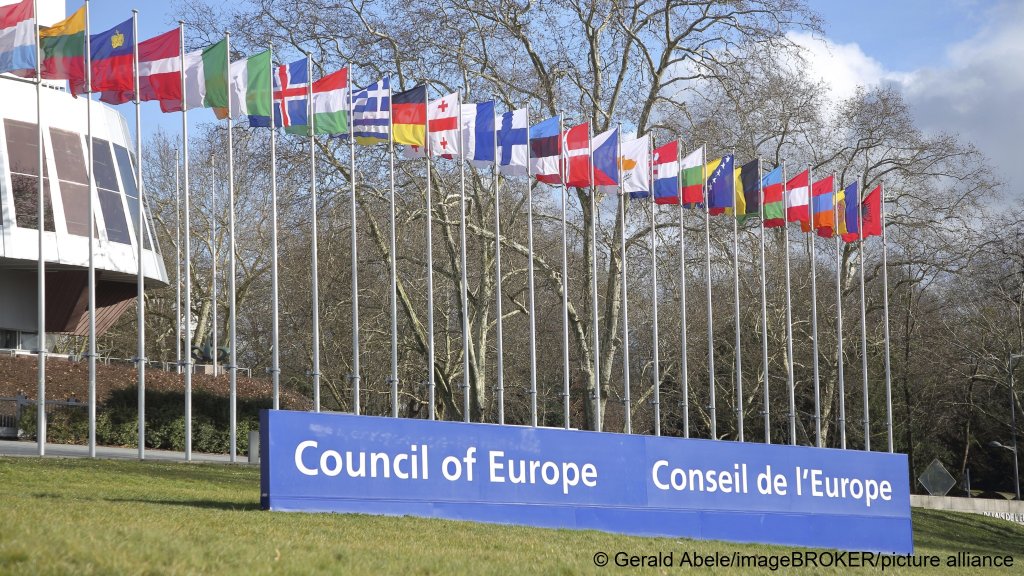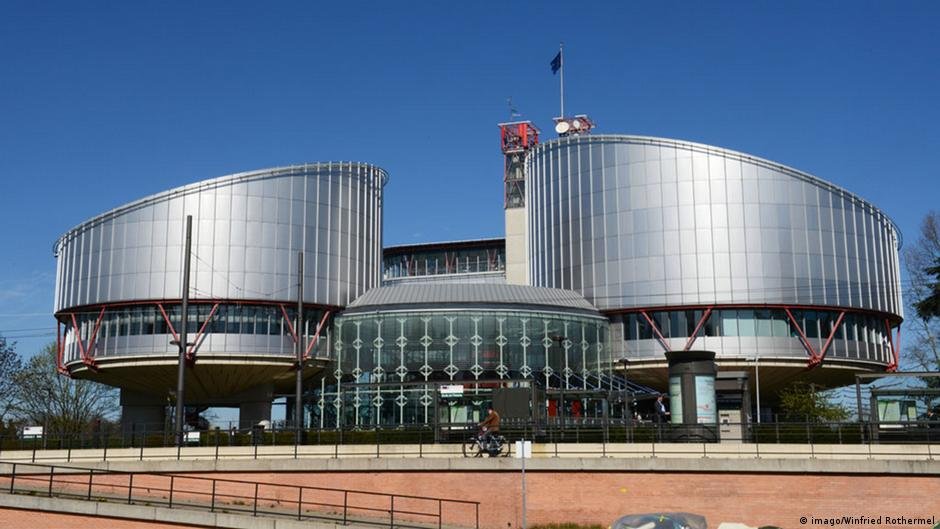European nations have progressively been tightening their asylum and immigration laws in recent years, but to do so further might require a change to the regulations governed by the European Convention on Human Rights (ECHR). Now several EU nations, as well as the UK are beginning to put forward proposals towards how that might be done.
Several EU members in recent months have repeatedly voiced a desire to change — or at the very least — reinterpret certain guidelines pertaining to the European Convention on Human Rights (ECHR) so they can adapt their own national laws in ways that would allow them to further restrict asylum and implement related immigration controls.
Earlier this year, nine EU member states came together to issue a call to the bloc to change its interpretation of the ECHR, which governs many fundamentals relating to asylum law for those countries signatories to the convention — especially in all matters relating to the human rights of migrants and refugees.
Italy, Denmark, Austria, Belgium, the Czech Republic, Estonia, Latvia, Lithuania and Poland joined forces and demanded that the EU streamlines its laws to expel foreign criminals — even if this means that guidelines issued under the ECHR have to be reexamined and adapted accordingly. Great Britain is also beginning to think along those lines, although it is no longer and EU member state.
The nine nations in particular want the European Court of Human Rights, which is the final instance for ruling on ECHR-related matters, to revise and relax its guidelines on the deportation of such criminals to countries, which are not deemed safe.
In their view, an asylum seeker forfeits their right to protection if they significantly break the law of the country which hosts and protects them.
Examples of clashes between EU and ECHR
Some EU nations, such as France, have faced frustrations when trying to further tighten their asylum laws, as constitutional and legal experts rejected tabled bills, which were incompatible with the ECHR.
Other members of the bloc, like Greece, have faced criticism for using emergency measures to stop the processing of asylum applications earlier this year in Crete amid a sudden rise in arrival numbers, with the European Court of Human Rights reminding the Mediterranean nation that it can only suspend such asylum procedures for a limited window of time.
Read AlsoECtHR finds Greece's border 'pushbacks' illegal in landmark ruling

Italy, meanwhile, has repeatedly run into legal trouble at multiple levels — mainly national — with its plan to proactively intercept some migrants in international waters in the Mediterranean and then take them to two purpose-built facilities in Albania for remote processing; those deemed ineligible for asylum could then be returned directly from non-EU member Albania with far less red tape than is involved in Italy.
Many of the legal hold-ups relating to the Albania process ultimately have to do with what the ECHR does and does not allow — or rather, the interpretation of various Italian judges thereof.
Read AlsoItaly, other EU states urge rethink on European rights convention
UK: push for even greater ECHR changes
Separate to this development, Britain has also repeatedly voiced staunch demands to change certain ECHR fundamentals or be allowed to change its interpretation of the laws — with some politicians even threatening to exit the treaty altogether.
This week, the UK's government once again announced it hoped to introduce sweeping changes to its asylum law, some of which may at the current time not entirely be in line with some legal ECHR basics.
Among several new restrictions tabled to be introduced, the UK hopes to introduce a system whereby asylum seekers pegged to be deported can always be sent back to their country of origin; if the country of origin refuses to accept their own people back, the British government might go as far as banning anyone from that country from being issued with visas, as part of a proposed tit-for-tat policy, according to UK Home Secretary Shabana Mahmood.
Read AlsoUK: Inside Labour's most radical asylum overhaul in modern times
This blanket refusal, among other proposed changes, might however be in breach of ECHR guidelines, at least at the present moment.
Among EU nations, Denmark has recently expressed the view that it would be happy to join forces with Britain to push for a re-examination of how the ECHR is applied.

ECHR Article 3: What qualifies as 'torture'?
Details on concrete proposed changes to the ECHR are currently only known from UK lawmakers and not from European ones, although it is likely that they will overlap.
British authorities want in particular to see changes, amendments or legally binding reinterpretations to Article 3 of the treaty, which deals with the prohibition of torture, inhuman or degrading treatment, and Article 8, which governs the right to family life.
Multiple deportations of criminal asylum seekers have been blocked due to an interpretation of Article 3, whereby sending someone back to a country from which they have escaped would constitute a form of torture; Britain argues that it is in its own public's best interest to allow such deportations to prevent future crimes and to serve as a deterrent to other foreigners who might consider engaging in criminal activities.
ECHR Article 8: A family affair
Article 8 of the ECHR meanwhile has been used to justify family reunifications, which Britain and other countries currently critical of the ECHR do not want to ban altogether but to make considerably more difficult, for example by introducing certain income thresholds to qualify applicants to send for immediate family members.
In the past, some attempts at limiting family reunification rights have been halted by citing Article 8; the same law has also been cited in the past — in connection with other laws — to prevent the deportation of entire families to safe countries or countries which have been deemed safe once again.
The Home Office says, for example, that currently in Britain, "there are around 700 Albanian families whose asylum claims have been rejected, yet their removal is not currently being enforced by the Home Office, despite Albania having a gold-standard of cooperation with the UK on returns and being a signatory to the European Convention on Human Rights (ECHR)."
"Article 8 rights are currently leading to high numbers of arrivals from those who would not otherwise have the right to live in the UK," a press release by the Home Office earlier this week further highlights.
Read AlsoUK intends to follow Denmark's lead in tough-on-immigration legislation
The definition of a 'safe country'
The definition of safe countries in general is also a thorn in the side of many European nations that are hoping to tighten their asylum laws, as squaring that with their membership of the ECHR has repeatedly proven problematic.
Many individual governments across Europe, as well as the EU itself, have designated lists of countries they consider 'safe' and are therefore destinations for possible deportations of nationals from that country, who have been refused protection by the host country.
In April 2025, the European Commission proposed to formalize this, including Bangladesh, Kosovo, Egypt, Morocco, Colombia, India and Tunisia on the list of safe countries.
This broadening of safe nations has been justified in legal documents from the European Commission by stressing that it would not interfere with individual assessments of asylum, as a country might not be safe for all inhabitants of a certain country, depending on their individual circumstances and experiences, which may have led them to claim protection elsewhere.
However, the EU also tried to argue as an extension to those changes that any country could be considered 'safe' if 20 percent or fewer applicants from that country generally were granted protection in the EU, which the human rights organization Amnesty criticized as a loophole of the proposed regulation.
A statement from Amnesty in July 2025 underlined: "The fact that up to 20 percent of those applying for international protection from these countries are recognized as refugees indicates that these places are in fact not safe for all."

CJEU ruling and Italy's Albania plans
Another example for the ongoing debate on safe countries of origin is a judgment from August this year by the Court of Justice of the European Union (CJEU) regarding Italy's attempts to designate certain countries 'safe' — such as Bangladesh and Egypt.
The judgement underlined that migrants should always have the right to challenge such designations in court, and that countries must make accessible the information they used to reach the designation of 'safe' for each individual case, according to a statement from the International Bar Association (IBA), which is the global voice of the legal profession.
The new EU Pact on Asylum and Migration, which is due to come into effect next year, sets out to strengthen the right of designation of 'safe' countries, but the CJEU judgement, according to some legal experts quoted by the IBA, might still strengthen challenges to the pact in the future.
"The buried treasure in the [CJEU judgment] is the effectiveness of a challenge, and access to documents," says Steve Peers, a professor of EU and human rights law at Royal Holloway, University of London, who commented in the IBA article on the issue.
"With the new EU Pact, it might be easier to say a country is safe but it will [also] be easier to challenge this in individual cases."
Changes to ECHR possible — but at what cost?
The Council of Europe (CoE), which oversees the application and implementation of the ECHR, has responded to these recent developments by declaring that it is "absolutely ready" to consider discussing changes to the treaty.
Its secretary general, Alain Berset, said that it might be time for the organization "to change and adapt," while firmly stressing, however, that this could also weaken the international organization, which was formed in the wake of World War II to stop future conflict.
"These are complex challenges, and democracies must always remain open to reflection through the appropriate institutional avenues," Berset said earlier in the year.
Read AlsoCouncil of Europe defends human rights court amid tensions over migrant returns
The ECHR can be — and has in the past been — amended by adding new so-called protocols.
With different member states having varying migrant population and native population rates, there is also a risk that a "one size fits all" approach to these challenges would not leave all signatory states equally satisfied.

ECHR: an instrument of peace causing discord
All EU nations as well as non-EU member United Kingdom are signatories to the ECHR, which is not directly related to the European Union.
The ECHR is a treaty dating back to the early 1950s, which provides a loose but binding framework to protect the human rights and fundamental freedoms of people, whose governments are part of the Council of Europe (CoE), which is headquartered in Strasbourg, France.
The Council of Europe has 46 member states, and its main body, the European Court of Human Rights, which is also based in Strasbourg, is in charge of making sure that all its signatory states comply with the legal framework set by the ECHR.
All 27 EU nations have to be signatories to the Council of Europe; however beyond the UK, non-EU members include such nations as Turkey, Armenia and Montenegro.
Until its 2022 invasion of Ukraine, Russia was also a member; it has been suspended since.
Read AlsoCouncil of Europe warns against third-country asylum deals
with Reuters
